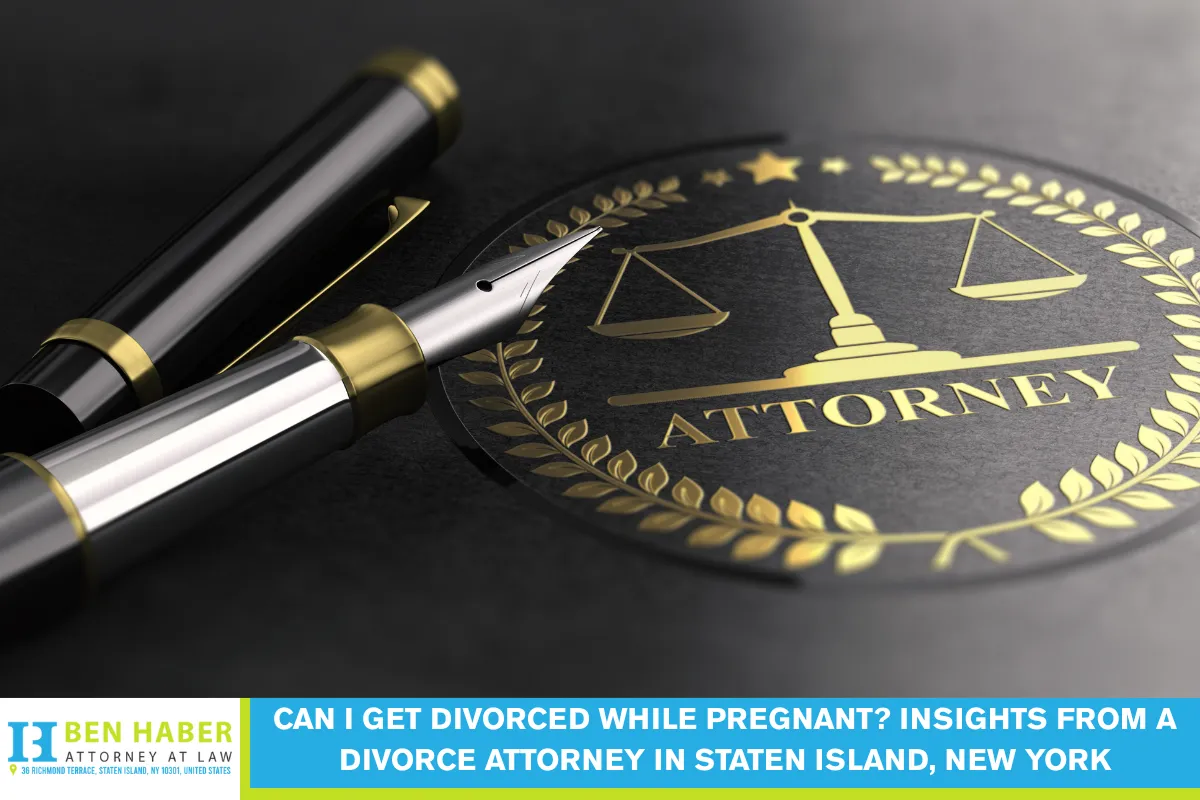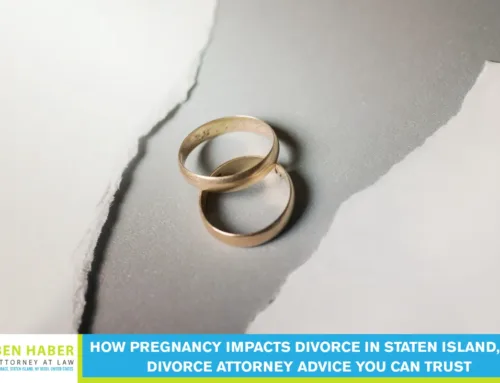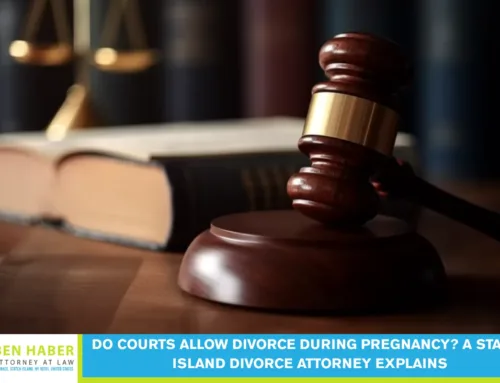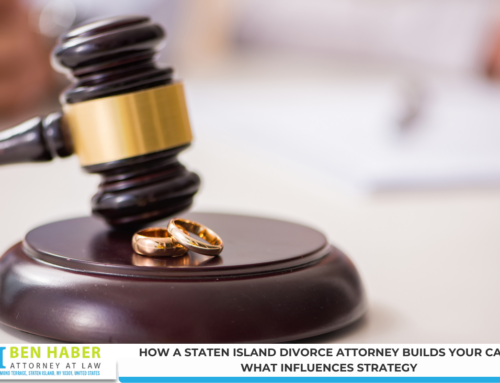A divorce attorney in Staten Island often gets asked whether it’s possible to get a divorce while pregnant—and the short answer is yes. But that’s only the beginning of the story. Filing for divorce during pregnancy involves unique legal, emotional, and logistical challenges, especially when the case is handled in a local New York court.
Pregnancy is one of life’s most delicate and life-altering stages. Combine that with the legal process of ending a marriage, and you’re looking at a situation that requires careful thought, planning, and guidance. Understanding the legal landscape in Staten Island can help reduce stress and prepare you for what’s ahead.
Let’s take a closer look at what you need to know.
Understanding the Legal Possibility of Divorcing While Pregnant in New York

Getting divorced while expecting a child isn’t illegal in New York State. There are no laws that prohibit a couple from filing for divorce just because one spouse is pregnant. The court system in Staten Island will accept divorce filings during pregnancy the same way it does in any other situation.
However, pregnancy introduces complexities that can affect the pace, process, and outcome of the divorce. While a couple can file for divorce, many judges prefer to wait until the child is born before finalizing the terms—especially those related to custody, parenting time, and child support. These elements depend heavily on the child’s birth and early health needs, which can’t be fully assessed until after delivery.
Why Courts May Delay Divorce Finalization During Pregnancy
Though the law allows divorce during pregnancy, the family courts in Staten Island often exercise caution. Judges generally act in the best interests of the child. Since an unborn baby hasn’t yet entered the world, they may postpone decisions that could impact the baby’s well-being.
One of the biggest reasons for delay is the need to establish paternity. If both spouses agree on the father’s identity and no one contests it, the process can move more quickly. But if there’s any doubt or dispute—especially if the pregnant spouse believes the child isn’t biologically related to the husband—then the court must wait for a DNA test after birth.
Another reason for delays is the court’s reluctance to create custody or support orders without knowing what the child will need medically or developmentally. Each case is different, but the priority will always be the child’s future care and stability.
The Legal Process of Divorce in Staten Island

Filing for divorce in Staten Island follows a structured process, even when pregnancy is involved. Here’s how it typically unfolds:
Filing the Divorce Petition
The process begins by submitting a petition for divorce in Richmond County Supreme Court. This petition outlines the reason for the divorce and includes requests for child custody, support, and asset division if applicable.
New York is a no-fault divorce state, which means one spouse can claim the marriage has broken down beyond repair for at least six months. This simplifies the filing process, regardless of whether you are pregnant or not.
Serving the Other Spouse
Once the petition is filed, the other party must be officially served with the divorce papers. This ensures that both parties are aware and involved in the legal proceedings. Even during pregnancy, this step is required and must be documented.
Response and Court Proceedings
After the other spouse receives the papers, they can respond by agreeing or contesting any part of the filing. If the couple agrees on all terms, the process can move fairly quickly. However, if there are disagreements—especially related to the unborn child—then the court will schedule hearings to resolve those issues.
Temporary Orders
Pregnancy-related needs may be addressed through temporary court orders. For instance, a judge might require the other spouse to help cover medical expenses, living arrangements, or insurance coverage during the pregnancy.
These temporary orders can help stabilize the household until the baby is born, allowing the court to issue more permanent decisions.
How Paternity Affects Divorce During Pregnancy

Paternity refers to the legal recognition of a man as the child’s father. In New York, when a woman is married, the law automatically assumes her husband is the baby’s biological father. However, that assumption can be challenged.
If there’s a paternity dispute, the court will usually delay issuing custody or child support orders until the child is born and genetic testing can be done. This ensures that support is assigned correctly and that parental rights are properly established.
It’s important to understand that paternity issues can complicate the timeline of a divorce. The court needs all information related to the child’s biological parents to make informed decisions, especially in terms of custody and future parenting arrangements.
Child Custody Considerations Before and After Birth
While a baby is still in the womb, it’s impossible for the court to fully assess parenting capacity, living situations, or the specific needs of the child. As a result, custody decisions are usually postponed until after delivery.
That said, custody planning can still begin during pregnancy. A divorce attorney can help draft temporary agreements that set expectations for parenting time, visitation schedules, and co-parenting responsibilities once the baby is born.
These agreements aren’t final but can provide peace of mind and reduce future conflict. Once the baby is born, the court will finalize custody based on several factors, such as:
The emotional bond between each parent and the child
Each parent’s living environment and ability to provide care
The physical and mental health of each parent
Willingness to cooperate in a co-parenting arrangement
Child Support and Financial Obligations During Pregnancy

Financial support is a major concern during and after pregnancy, especially if one spouse is the primary income earner. New York law allows for temporary financial orders during the divorce process, which can include:
Prenatal medical care costs
Hospital bills related to childbirth
Shared insurance premiums
Temporary spousal support if needed
These financial considerations are often addressed in court during the pregnancy. Once the child is born, long-term child support amounts will be calculated based on state guidelines, which consider both parents’ incomes, living costs, and number of dependents.
Emotional Stress and Health Considerations
Divorcing during pregnancy is not just a legal challenge—it’s an emotional one. Stress levels during pregnancy can affect both the mother and the baby, making it even more important to have emotional support and proper legal guidance.
The physical demands of pregnancy—doctor visits, prenatal care, and hormonal changes—can add pressure to the already tense environment of a dissolving marriage. That’s why working with a calm, experienced divorce attorney who understands the unique emotional dynamics at play is essential.
Seeking counseling or therapy, staying connected to trusted friends and family, and creating a healthy routine can all help minimize the mental strain of going through a divorce while preparing to bring a new life into the world.
Key Challenges Faced in Staten Island Divorce Cases Involving Pregnancy

Each divorce is different, but here are some common hurdles Staten Island residents may encounter when one spouse is pregnant:
Delays in final rulings due to pending childbirth
Complicated paternity questions if the biological father is not the spouse
Uncertainty in support agreements if the child’s needs aren’t yet known
Increased emotional strain from balancing legal and medical concerns
Logistical challenges such as attending court hearings during late pregnancy or postpartum recovery
These are not insurmountable problems, but they do require preparation. A good attorney will help you develop a plan, gather all necessary documents, and advocate for your rights with sensitivity to your situation.
Making a Confident Decision
Deciding to end a marriage while pregnant is deeply personal. Some people feel they need to move forward for the health and safety of themselves and their future child. Others may want to wait until after the birth to avoid unnecessary complications.
There is no right or wrong answer—only what’s best for your specific situation. Suppose divorce seems like the most viable path. In that case, it’s essential to approach the process with a thorough understanding of the legal steps involved and a clear support network.
You don’t have to make every decision overnight, but having professional guidance early can help you avoid legal missteps and unnecessary stress.
Staten Island Divorce Attorney – Benjamin Haber

The Law Office of Benjamin Haber provides legal support for individuals in Staten Island who are going through divorce, including cases involving pregnancy. We understand how complex these situations can be, and we focus on helping you navigate the legal process with clarity and confidence.
Our office handles both uncontested and contested divorces, and we have experience in matters involving child custody, child support, and paternity. With years of experience working within Staten Island’s court system, we know how to protect your rights and guide you through each step efficiently.
To speak with an attorney or schedule a consultation, call (718) 442-0960. We’re here to help you make informed decisions and prepare for what’s next.
Frequently Asked Questions – Divorce While Pregnant in Staten Island, NY
Can child support be established before the baby is born?
No, child support typically cannot be legally enforced until after the child is born. While a family law attorney can begin preparing the necessary legal documents, the actual support payments depend on the child’s birth. That said, temporary spousal support or assistance with medical expenses can be requested during pregnancy through the court.
Here’s what can happen before birth:
A petition for support payments related to prenatal care can be filed.
Courts may issue temporary orders to assist with hospital bills and health insurance.
Final child support orders will be determined after the child is born.
After birth, the parenting plan and custody arrangements are developed based on each parent’s financial and emotional capability. The state laws in New York use a formula based on income and expenses to calculate child support, and a family law attorney can help ensure everything is filed correctly in a Staten Island court.
What happens if paternity is in question during a divorce?
If paternity is disputed during a divorce filing, it becomes a central issue in the proceedings. According to New York state laws, a husband is presumed to be the legal father of a child born during marriage. However, if there’s any doubt, DNA testing is necessary to resolve it. This legal complexity often delays the finalization of divorce proceedings.
Key things to know:
Paternity must be resolved before a custody agreement or child support can be finalized.
DNA testing is usually conducted post-birth, with both parties required to participate.
A paternity challenge can be brought by either spouse or the biological father (if different).
This issue directly affects custody determinations and support payments. Without a confirmed father, the court cannot decide who has legal responsibility or parenting rights. Family attorneys in Staten Island regularly handle these cases. They can guide you through the proper steps to clarify paternity and protect your legal rights.
Are there special considerations for property division during pregnancy?
Yes. While pregnancy itself doesn’t directly affect property division, the timing of the final divorce and overall custody arrangements can influence financial outcomes. Under New York family law, marital assets are distributed based on what’s considered fair, not necessarily equal.
Key considerations include:
Duration of the marriage
Financial and non-financial contributions of each spouse
Future needs of each spouse, especially the pregnant party
Health and earning capacity
In Staten Island courts, legal complexities arise when dividing property during pregnancy due to potential delays in finalizing legal arrangements involving the child. A divorce attorney can help ensure that all legal documents accurately reflect current needs while anticipating future changes that may arise after the child is born.
It’s also important to consider how spousal support and ongoing support payments may impact post-divorce financial planning. Consulting with a family law attorney helps ensure that long-term stability is part of the overall property division strategy.
Can custody be determined before the child is born?
Not entirely. Custody determinations in Staten Island courts generally take place after the child is born. However, a family law attorney can help draft preliminary parenting plans or proposed custody arrangements during pregnancy to prepare for what’s ahead.
Here’s what can be done before birth:
Both parties can agree to a custody agreement in principle.
A divorce attorney can create a draft parenting plan that will be reviewed and finalized after delivery.
Courts may issue temporary legal arrangements for support or to make medical decisions.
Once the child is born, a judge will assess several factors, including the child’s best interests, the home environment, parental capabilities, and more. These custody determinations often lead to detailed legal documents outlining each parent’s role and responsibilities.
Pregnancy complicates immediate decisions, but planning with experienced family attorneys ensures a smoother process once the baby arrives.
Is a summary dissolution available during pregnancy in New York?
No. Summary dissolution, or simplified divorce, is not an option in New York—regardless of pregnancy. Pregnancy may introduce more legal complexities, making the process longer rather than shorter. Filing for divorce in Staten Island must go through the regular legal process, even in uncontested cases.
Requirements for a full divorce process include:
Filing formal legal documents with the Richmond County Supreme Court
Serving the other party and allowing time for a response
Addressing all issues like child custody, property division, spousal support, and potential support payments
Even if both parties agree on all terms, the presence of a child—born or unborn—necessitates more detailed legal arrangements. Judges will not issue a final divorce until all aspects concerning the unborn child are fully planned, or, more commonly, until after birth.
To avoid delays or mistakes, it’s best to work with a divorce attorney familiar with Staten Island procedures and family court expectations.
Read more: How a Staten Island Divorce Attorney Builds Your Case: What Influences Strategy






